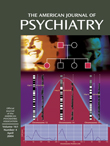Cognitive Functioning in Late-Life Bipolar Disorder
Abstract
OBJECTIVE: This study characterized cognitive functioning in elderly patients with bipolar disorder. METHOD: The cognitive functioning of 18 euthymic patients with a history of bipolar disorder I or II, ages 60 years and older, was tested with the Mini-Mental State Examination (MMSE), the Mattis Dementia Rating Scale, and the Executive Interview. Cognitive functioning in these subjects was compared with that of an age- and education-matched group of 45 comparison subjects without mood disorders. RESULTS: Approximately half of the bipolar subjects scored one or more standard deviations below the mean of the comparison subjects on the MMSE (N=8, 44%) and the Mattis Dementia Rating Scale total (N=10, 56%). On the Executive Interview, three subjects (17%) scored between one and two standard deviations below the mean of the comparison subjects. CONCLUSIONS: A significant proportion of older bipolar subjects exhibited neuropsychological deficits when they were clinically euthymic.



